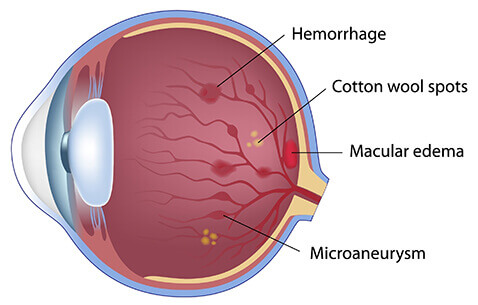Macular Edema

The macula is a very small area at the center of the retina—a thin layer of light-sensitive tissue that lines the back of the eye. Light rays are focused onto the retina, where they are transmitted to the brain and interpreted as the images you see. It is the macula that is responsible for your pinpoint vision, allowing you to read, sew or recognize a face.
Macular edema develops when blood vessels in the retina are leaking fluids. The macula becomes swollen and does not function properly. Vision loss may be mild to severe, but in many cases, your peripheral (side) vision remains.
Macular edema is often a complication of diabetic retinopathy and is the most common form of vision loss for people with diabetes—particularly if it is left untreated.
Eye surgery, including cataract surgery, can increase your risk of developing macular edema due to blood vessels becoming irritated and leaking fluids.
Symptoms
Macular edema is often painless and you may not notice symptoms. When symptoms do occur, they are a sign that the blood vessels in your eye may be leaking.
Symptoms of macular edema may include blurred or wavy central vision and/or colors appear “washed out” or changed.
If you have macular edema symptoms, you should see your OCB eye doctor right away. If left untreated, macular edema can cause severe vision loss and even blindness.
Treatment
The OCB Retina Team provides comprehensive evaluation, treatment and support for our patients with macular edema. Treatment options for macular edema include focal laser treatment, which stabilizes vision by sealing off leaking blood vessels that interfere with proper function of the macula. This is usually recommended for those with macular edema resulting from diabetes or retinal vein occlusion.
Medication injection therapy is also being used to treat macular edema. Two drugs —steroids and anti-VEGF agents — have shown promise in reducing diabetic macular edema. Anti-VEGF drugs target a specific chemical in your eye called vascular endothelial growth factor — or VEGF — that is critical in causing abnormal blood vessels to grow under the retina. Several drugs have been developed that can block the trouble-causing VEGF. An anti-VEGF drug can help treat macular edema by reducing the growth of abnormal blood vessels and slowing their leakage, which helps to slow vision loss.
For people with diabetes, controlling blood sugar and blood pressure is another method of macular edema treatment.
Your OCB eye doctor will determine which therapies are best for you based on your unique individual needs and will develop a treatment plan designed to yield the best possible outcome for you and your quality of life.
